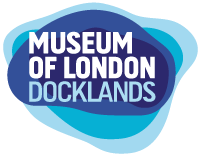
Home | Interviews | Writing | Film | Blog

Home | Interviews | Writing | Film | Blog
Brass Tally Men is a project set up and run by educational charity digital:works.
This project is an oral history of London's dock workers focusing on the fascinating history of the people who worked on the docks of London from the 1930s up until the closing of the docks from the 1970s. It explores their working lives and how the docks shaped whole communities in London for centuries.
Children from Riverside and Westminster Cathedral primary schools which have links to the docks explored the history and gained skills enabling them to produce an exhibition and oral history based documentary film that will be shared widely. In order to deepen this learning we worked with the Museum of London Docklands, historians, two local archives and the community of retired dockers.
The Museum of London Docklands hosted the launch of the project with the children taking part in guided tours of the galleries and history workshops. They also hosted the reminiscence group sessions with retired dock workers and are supporting the project with access to archive material. In January 2019 the launch screening of the children's film will also be held at the Museum.
The children also went out on the river with dockers to explore the history before recording the interviews.
A reminiscence group explored the lives of the dock workers.
This project website houses historical and creative writing, the full interviews and the film when completed.
A big launch event will share the film and writing. There will be additional active learning sessions using the film which will also be shown on television.
We are grateful to Unite the Union and the Heritage Lottery Fund for financially supporting this project.



digital:works has been running oral history projects across London working with communities to explore the history of work and workers in the capital. Projects so far include printers on Fleet Street, bus workers, underground workers, black cab drivers, jewellers in Hatton Garden, tailors in Saville Row, the Thames Lightermen, Thames boatyards and more. Other projects explore the history of Battersea, North Kensington, Southall, Eel Pie Island, as well as some of London’s indoor and street markets. If you would like to see any of these wonderful films and find out more about digital:works please visit:
www.digital-works.co.uk.

We were saddened to hear of the passing of our friend and colleague Brian Grover. He was an integral part of the On The Docks project providing much of the historiacal research material, access to former dockers and a very entertaining guided talk along the river for the young people. He also agreed to be interviewed for the project and his interview is a joyous litany of information and humorous stories - which summed up the man. Have a listen.
Our sympathies go out to his family and friends.

Brass Tally Men
"Before the Dock Labour Scheme was created in 1946, bringing with it at least some guarantee of pay, the dockers were each given a brass tally, oval in shape. They would hand this in when given a job for the day, and collect it again when given their pay. If they didn’t get a day’s work they would have to sign on at the local Labour Exchange, bearing their brass tally as proof".
This project explores the heritage of the London docks with the focus on the history of the people who worked in the East End of London from the 1930s until their closure in the 1970s. The docks date back to Roman times but our fascinating story concentrates on living memory with the stories exploring life on the thriving docks that received thousands of ships every year from all over the world. The docks dominated the banks of the River Thames and the communities in the East End of London that worked in them. Thousands of men and some women and children worked on the docks doing various jobs.
We have spoken to several dock workers while researching this project. The two oldest were born in the early 1930s and remember their fathers going to work and the life and stories of the docks. This employment dominated the East End of London and with generations of families working in the industry, the docks had a profound affect on the work and culture of this part of London. The project explores the history of the work, the tools of the trade, the particular skills, the language of the work. It also explores the culture of the communities that relied on the river, family life, women's roles, and childhood in the shadow of the huge cargo vessels that ploughed past riverside bedroom windows, their ship's horn punctuating the night.
Meanwhile pubs were full of dock workers, often singing music hall songs about the history of the work.
There are keys moments in this history. The project charts the period of the depression in the 1930s when many dockers lost their jobs and families struggled. It was in 1936 that the infamous "Battle of Cable Street" took place when Jewish residents and workers in the East End stood up against a fascist march, many of the marchers were dockers and the fathers of some who will be interviewed for this project. The devastation of World War 2 and the blitz on the docks. The increasingly lively docks of the 1950s and 60s when the river once again became busy. The period from the 1960s is characterised by slow decline with the advent of containerisation, with disputes and the infamous dockers strike in 1972 and the "Pentonville 5" when five shop stewards were jailed in July 1972 by the National Industrial Relations Court for refusing to obey a court order to stop picketing a container depot in East London. Their arrest and imprisonment led to the Trades Union Congress (TUC) calling a general strike. From here the closure of the docks accelerated and led to the disappearance of the trade that had existed in London for 2000 years and the culture, language and lore that surrounded them.
Now the docks have been converted to marinas, shopping centres and luxury housing, and the communities that surround them are losing connections to this amazing history. This project has researched, recorded and shares this history, keeping it alive for future generations.